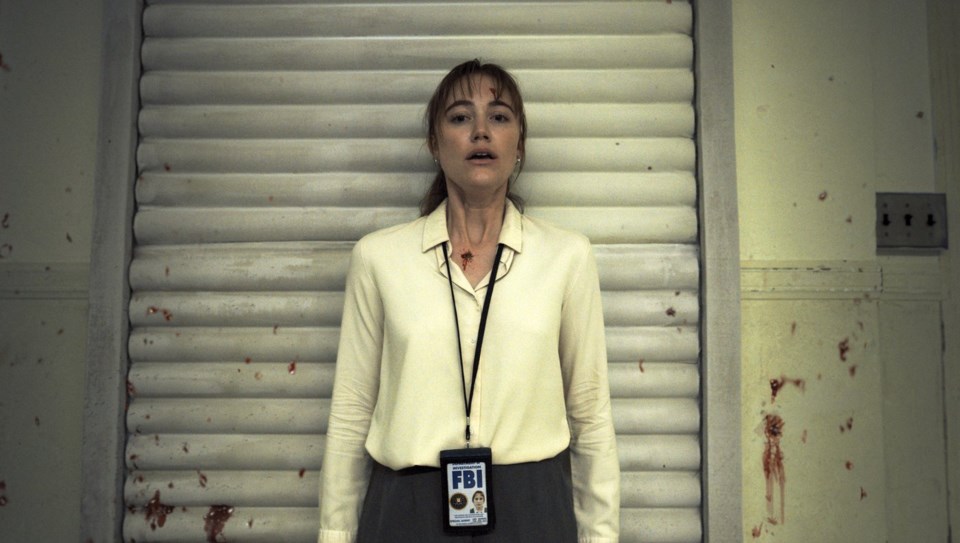A chilling, half-remembered encounter from childhood looms over “Longlegs,” Osgood Perkins’ stylishly composed 1990s-set horror film about a young FBI agent (Maika Monroe) whose past seems to hold a key to a decades-long serial killer suburban spree.
In the opening flashback scene of “Longlegs,” a young girl walks out of her house to meet a stranger on her snow-covered yard. We never see more than the bottom half of his face, but the sense of creepiness is overwhelming. The image, with a scream, cuts out before “Longlegs” properly gets underway.
Twenty five years later, that girl (Monroe’s Lee Harker) is now grown and brought into the investigation. She’s preternaturally good at decoding the serial killer’s choreographed targets, but her psychological astuteness has a blind spot. In Osgood’s gripping if trite horror film about an elusive boogeyman, the most unnerving mystery is the foggy, fractured nature of childhood memory.
“Longlegs,” which opens in theaters Thursday, is arriving on its own wave of mystery thanks to a lengthy, enigmatic marketing campaign. Is the buzz warranted? That may depend on your tolerance for a very serious procedural that’s extremely adept at building an ominous slow burn yet nevertheless leads to a pile-up of horror tropes: satanic worship, scary dolls and an outlandish Nicolas Cage.
It’s a credit to the harrowingly spell-binding first half of “Longlegs” — and to Monroe — that the film's third act disappoints. After that prologue – presented in a boxy ratio with rounded edges, as if seen through an overhead projector — the screen widens. Harker, a terse, solitary detective, is part of a large task force to track down the killer behind the deaths of 10 families over the course of 30 years. Sent to knock on doors, she gazes up at a second floor window and knows immediately. “It’s that one,” she tells a partner (Dakota Daulby) whose lack of faith in her intuition quickly proves regrettable.
Harker is brought in for a psych evaluation that demonstrates her strange clairvoyance. Agent Carter (Blair Underwood) gives her all the accumulated evidence, which suggests the same killer — every murder scene has a coded letter left signed by Longlegs — but at the time points to no intruder within the homes of the murdered. Carter is reminded of Charles Manson. “Manson had accomplices,” Harker reminds him. Also troubling: all of the victims have a daughter with a birthday of the 14th of the month, a trait Harker, naturally, shares.
Families are prominent in the narrative, too. Harker occasionally visits her shut-in mother (Alicia Witt) and their brief interactions suggest a knowingness with the cruelty of the world. One time on the phone, Harker tells her she's been busy with “works stuff.”
“Nasty stuff?” the mom asks. “Yep,” she answers.
Scenes of dread follow as they hunt the killer in rural Oregon. They frequent the usual spots: an old crime scene, a locked up barn, an old witness in a psychiatric hospital. Longlegs (Cage) is skulking about, too, and leaves a letter for Harker. We see him fleetingly at first. He’s a bleached, pale figure who, with long white hair, looks increasingly clownish the nearer we get to him. If Manson belonged to the ’60s, Longlegs, with his Bob Dylan Rolling Thunder Revue white face, seems a product more in the ‘70s. T.Rex opens and closes the film and the album cover of Lou Reed’s “Transformer” sits above his mirror.
Perkins (“Gretel & Hansel”), is the filmmaking son of Anthony Perkins, who famously played one of the movies’ most unsettling characters in Norman Bates of “Psycho.” The roots of “Longlegs,” which Perkins also wrote, have personal connections for the director, Perkins has said, about his own upbringing and his father’s complicated private life. But something deeper struggles to pierce “Longlegs." Its sense of horror seems to come mainly from little besides other movies. “Se7en” and “The Silence of the Lambs” are clear touchstones. Longlegs ultimately feels like more of a stock boogeyman and big-screen vessel for Cage.
In any case, this is Monroe’s movie. Her compelling screen presence in movies like “It Follows” and “Watcher” has earned her the title of today’s preeminent “Scream Queen.” But she’s much more than a single-genre talent. Again and again in “Longlegs,” Monroe’s Harker confronts a singularly disturbing scenario and walks right in. It’s not that she isn’t nervous; her heavy breathing is part of the artful sound design by Eugenio Battaglia. Monroe, steely and strong, cuts like a knife through this almost cartoonishly severe film. Nasty stuff? Yep.
“Longlegs,” a Neon release, is rated R by the Motion Picture Association for bloody violence, disturbing images and some language. Running time: 101 minutes. Two and a half stars out of four.
Jake Coyle, The Associated Press




